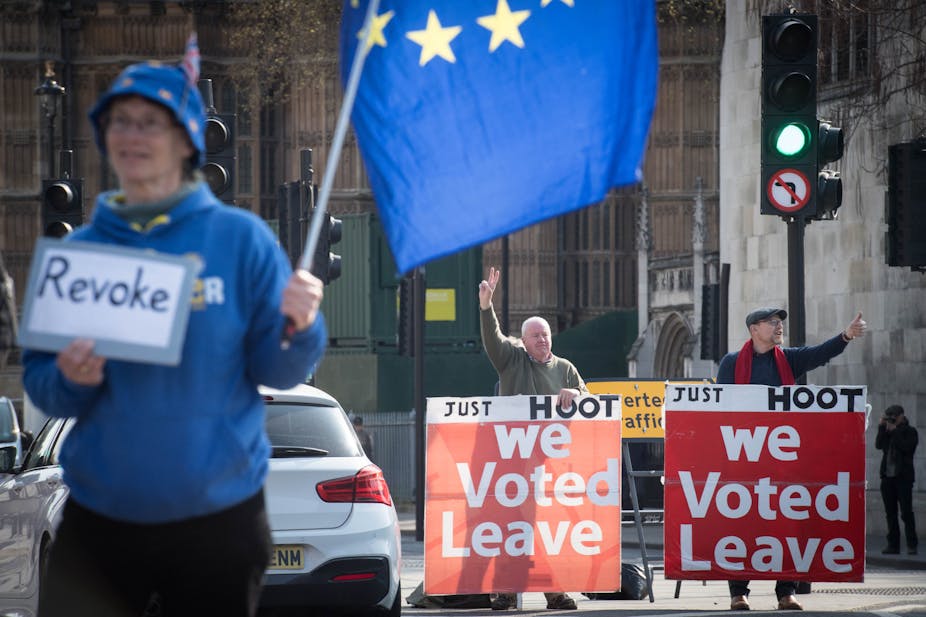Brexit is a deeply divisive issue. Even democracy itself turns out to be a source of disagreement. For some, democracy requires the UK to leave the EU quickly and by whatever means necessary to respect the result of the 2016 referendum. For others, democracy means a second referendum with the possibility of reversing the decision to leave.
How can the idea of democracy support two such seemingly contradictory conclusions? One body of expert knowledge that is particularly good at helping us to make sense of conundrums of this sort is democratic theory, a form of theory that seeks to both define democracy and evaluate actual democratic practices and institutions.
Democracy means “rule by the people”. But since the range of possible meanings that can be attributed to the terms “rule” and “people” are so numerous, democratic theory starts from the assumption that this basic definition does not take us very far.
Democracy means different things to different people and so the word has been attached to a range of different concepts and supporting theories. Liberal democracy, republican democracy, socialist democracy, participatory democracy and deliberative democracy are perhaps some of the more familiar terms.
The fact that there are so many different theories is a reminder that the meaning of democracy is not settled and that actual democracies are a work in progress. But it becomes a problem when people who use the term democracy to defend their views are either unable or unwilling to explain what they mean by it. Which brings us back to Brexit.

Liberal democracy
Often those who are pro-Brexit claim that a second referendum would undermine people’s trust in democracy. Presumably, those who hold this view believe that a second referendum would represent a departure from “rule by the people”. Yet those calling for a second referendum argue that if parliament were to decide that a second referendum is required, then this wouldn’t represent a departure from democracy since parliament is sovereign.
What’s key here is understanding what kind of democracy each side of the debate believes it is upholding.
Presumably, for those arguing that the 2016 referendum must be respected at all costs, democracy means that if I roll the dice and win, I cannot be compelled to role the dice again. For the sake of argument, let us suppose this to be based on liberal democratic theory.
While liberal theories come in different forms, they normally insist that individuals and their rights are what matter most. As long as we act within our rights, government is duty bound not to try to tell us what to think. Each of us has a right to form a view about Brexit. It follows that government must respect those views without further question – its sole job is to aggregate those views into a collectively binding decision. And just as it is not the government’s place to tell us what to think, it is not its place to require us to reconsider our earlier decisions.
Deliberative democracy
So what theory of democracy might be called upon to support those who claim that a second referendum should be welcomed? One obvious candidate is deliberative democracy. On a deliberative view, political decisions ought to be decided on their merits. Of course, people are still entitled to their views. But what they cannot do is simply impose those views on others. Since political decisions are collectively binding they should be mutually justifiable. People should give reasons for their views but should be equally willing to listen to what others have to say.
In the ideal case, the result is a consensus. However, since in reality consensus is very hard to reach – time is often short, evidence tends to be incomplete, and risks and benefits can be highly uncertain – decisions will typically need to be treated as provisional. In other words, an initial decision can always be revisited. On a deliberative view, therefore, a second referendum may actually be required now amid the Brexit stalemate. Short of a consensus, people should continue to test their views and in principle be prepared to change them.
The upshot, therefore, is that different democratic theories are likely to give different answers to the same question. Even so, it’s surely better to know what we’re arguing over when we disagree about democracy than to find ourselves at odds without ever really understanding why.
Democratic theory is not easy. But it is parliamentarians’ responsibility to “do” democratic theory on our behalf – and be clearly seen to do so. Unfortunately, all too many of them seem ill-equipped or unwilling. The former might be forgiven, the latter should never be.

